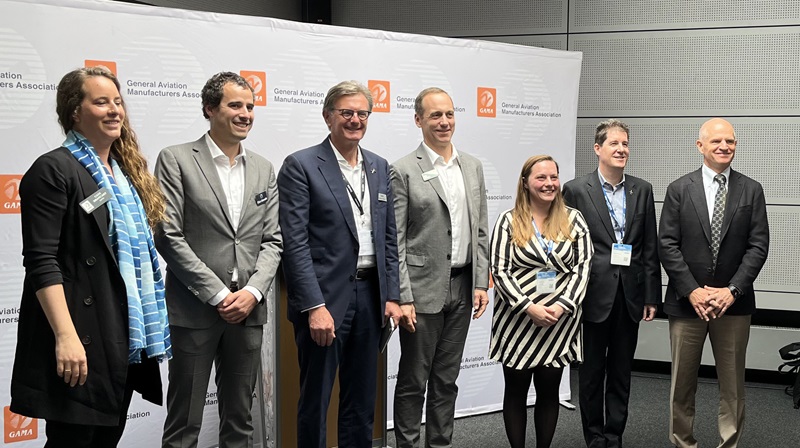Aviation industry looks forward to sustainable fuels
In his opening remarks at the General Aviation Manufacturers Association press conference at Aero Friedrichshafen, SimCom International CEO Eric Hinson set the tone of the day. He said that ultimately GA—and aviation in general—has to move away from the dependence on fossil fuel.
As aviation is very much in the public eye on that issue, he added that the myopic perception of GA as consisting of pilots flying for fun should be expanded to include pilot training, ambulance flying, humanitarian services, and cargo. He emphasized that the industry needs to do a better job to describe and define its image to the population not directly involved in aviation.
In the panel discussion, led by Cate Brancart, GAMA manager of European operations and safety, the focus changed to the areas of retaining and diversifying workforce and supply chains. The industry is suffering from a lack of qualified, young employees in all areas of expertise. Brancart said that in order to keep GA attractive to future generations, the industry itself should concentrate on inclusivity in the workforce, as well as on employee retention.
The panelists, consisting mostly of manufacturers of newer aircraft concepts (Urs Thomann, director of technologies and processes at Pilatus; Cyril Champenois, chief operation officer and co-founderof Elixir Aircraft; Rob Scholl, CEO of Textron eAviation; Jane Lefley, a consultant working with ZeroAvia; and Nicolas Chabbert, senior vice president of aircraft at Daher) described their efforts to attract and keep a younger workforce. Measures ranged from competitive salaries to employee surveys.
Champenois noted that at Elixir, this approach helped to hire a workforce that is on average 35 years old and 25 percent female. All panelists agreed that the younger generation was concerned about the environment and therefore more inclined to apply for positions in a field addressing the issue, such as zero emission engines and alternative fuels.
Scholl said that with Pipistrel’s Velis and the electric Panthera, Textron was offering unique opportunities to move away from classic, fossil fuel-powered aircraft, and was creating an inspiring workplace tailored to the leanings of a more progressive workforce.
Chabbert pointed out that the times when employees tied themselves to a company for most of their career were probably over and that a new generation of employees was more likely to hold several, consecutive positions throughout their working life. He said that the industry needed to adapt to that new standard. He added that new employees like to associate themselves with innovation and attractive brands.
The panel acknowledged that in order to keep GA as a viable option in the marketplace, the industry should make an effort to invite school-age children into the fold by giving presentations in schools, or offering internships that would lead to permanent employment. Newer aircraft concepts and complex engines would require a different skill set and different ways to cooperate throughout the manufacturing process. Overall, the necessity to communicate the good of GA and its efforts to adapt to an environment free of fossil fuels is no longer something that seems far away.



